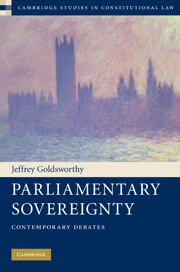Book contents
- Frontmatter
- Contents
- Detailed table of contents
- Acknowledgments
- 1 Introduction
- 2 The myth of the common law constitution
- 3 Legislative sovereignty and the rule of law
- 4 Homogenising constitutions
- 5 Abdicating and limiting Parliament's sovereignty
- 6 Trethowan's case
- 7 Requirements as to procedure or form for legislating
- 8 Judicial review, legislative override, and democracy
- 9 Parliamentary sovereignty and statutory interpretation
- 10 Challenging parliamentary sovereignty: Past, present and future
- Index
- References
10 - Challenging parliamentary sovereignty: Past, present and future
Published online by Cambridge University Press: 05 October 2010
- Frontmatter
- Contents
- Detailed table of contents
- Acknowledgments
- 1 Introduction
- 2 The myth of the common law constitution
- 3 Legislative sovereignty and the rule of law
- 4 Homogenising constitutions
- 5 Abdicating and limiting Parliament's sovereignty
- 6 Trethowan's case
- 7 Requirements as to procedure or form for legislating
- 8 Judicial review, legislative override, and democracy
- 9 Parliamentary sovereignty and statutory interpretation
- 10 Challenging parliamentary sovereignty: Past, present and future
- Index
- References
Summary
Introduction
Some critics portray the doctrine of parliamentary sovereignty as a myth that conceals the true nature of constitutionalism in Britain and other common law jurisdictions. In reality, they say, Parliament and the courts are engaged in a ‘collaborative enterprise’, with sovereignty divided between them; or the constitution is ultimately based on a common law ‘principle of legality’ which the courts, rather than Parliament, have ultimate authority to interpret and enforce.
Sometimes the critics really seem to be suggesting that the constitution is evolving inexorably in this direction. In fact, there are at least four different claims they might be making, which are not all mutually compatible. The first is that Parliament was never sovereign: that the doctrine of parliamentary sovereignty was always mistaken as a matter of law. The second is that, even if Parliament is accepted as sovereign today, this is a relatively recent deviation from a venerable constitutional tradition that should now be restored. The third is that even if Parliament was once sovereign, recent developments mean that it no longer is. The fourth is that even if Parliament was and still is sovereign, times are rapidly changing, and it is unlikely to retain sovereignty for much longer. Those who make the second, third or fourth claim often argue that parliamentary sovereignty is a doctrine of judge-made common law, which the courts may therefore unilaterally curtail. That argument has already been refuted.
- Type
- Chapter
- Information
- Parliamentary SovereigntyContemporary Debates, pp. 267 - 318Publisher: Cambridge University PressPrint publication year: 2010

